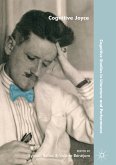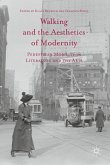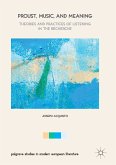Reconfiguring Nietzsche's seminal impact on modernist literature and culture, this book presents a distinctive new reading of modernism by exploring his sustained philosophical engagement with nihilism and its inextricable tie to pain and sickness. Arguing that modernist texts dramatize the frailty of the ill, the impotent, and the traumatised modern subject denuded of the traditional means to justify or redeem one's suffering, it uses the Nietzschean diagnoses of nihilism and what he calls 'ressentiment', the entwined feelings of powerlessness and vindictiveness, as heuristic tools to remap the fictional landscapes of Lawrence, Kafka, and Beckett. Lucid, authoritative and accessible, this book will appeal internationally to literature and philosophy scholars and undergraduates as well as to readers in medical and sociological fields.
Dieser Download kann aus rechtlichen Gründen nur mit Rechnungsadresse in A, B, BG, CY, CZ, D, DK, EW, E, FIN, F, GR, HR, H, IRL, I, LT, L, LR, M, NL, PL, P, R, S, SLO, SK ausgeliefert werden.









